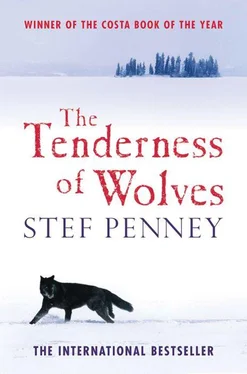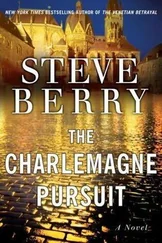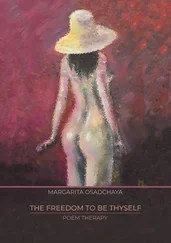Maria put her hands to her face in shock.
The river was playing a joke on them. The hands rotated slowly, reaching up out of the brown depths. They were bleached and slightly bloated. Then she saw the head below, now facing towards them, now turning away. The face is as clear in her memory now as it was then, and yet she could not describe it if she tried–whether the eyes were open or shut, or how the mouth was set. There was a peculiar horror in the lazy motion of the body caught in the eddy; by some freak chance it was twirling upright in one spot, hands above its head as if it were dancing a reel, and she could not stop watching any more than the others could. She knew the man was dead, but did not recognise him. Even afterwards, when told that it was Doctor Wade, she could not reconcile the face in the water with what she remembered of the elderly Scotsman.
Even now, all these years later, she has to force herself to peer into the depths of the dark pool. Just to be sure that it’s empty.
When they left the river, David held her hand on the way home. He was silent, unusually for him, and before they came out of the woods, he pulled her behind a tree trunk and kissed her. There was a desperate look in his eyes that scared her; she didn’t know what it meant. Frozen, unable to respond and somehow repelled, she pulled away and walked home ahead of him. Their friendship was never quite as easy as it had been after that, and the following summer his family moved back east. He was the only boy who ever wanted to kiss her, until Robert Fisher.
*
After nearly an hour she comes to Jammet’s cabin and dismounts. She walks through the crust of rotten snow round to the front door. The unwarmed roof still has snow on it, and the cabin looks small and dejected. Maybe a murder will be enough to put off prospective buyers, where a drowning was not.
There are various footprints circling the cabin, mostly of children playing dare. But in front of the door the ground is smooth–no one has been inside recently. Maria marches firmly across it. A wire on the door holds it shut. She takes this off, tearing the skin on her thumb. She has never been inside; Jammet was not thought a suitable acquaintance for girls of good family. She finds herself murmuring an apology to his spirit, or something like it, for the intrusion. What she is doing, she tells herself, is just checking to make sure that the bone tablet was not overlooked in a corner. A little thing like a bone tablet could easily have been missed. She is also forcing herself to do something she is afraid of, although exactly what she fears, she is not sure.
Only a weak light seeps through the buckskin window-panes, and the whole place has the queer feeling of being under a shroud. It is very quiet. There is nothing inside, other than a couple of tea chests and the stove, waiting for new hands to bring it back to life. And dust, like a thin layer of snowflakes on the floor. Her feet print a trail in it.
Even an empty house, it turns out, has plenty to offer when you start to look: old kitchen implements, pieces of newspaper, a handful of nails, wadded dark hair (she shudders), a bootlace … All the things that people don’t bother to remove, because they’re not worth anything; because no one would want such things, even the person who lived there.
We leave so little.
There is no way of knowing what Laurent Jammet was like now, not for her. Upstairs, where she ventures at length, there are a couple of half-empty wooden boxes. Nothing like a bone tablet in either, but she unearths something else, something tucked into the gap between the doorframe and the wall (and what made her look there?).
A piece of brown paper, such as you might find wrapping a purchase from Scott’s store, has been used as a makeshift artist’s pad, on which someone has drawn a pencil sketch of Laurent Jammet. Maria’s cheeks burn: in the drawing, Jammet lies on the bed, apparently asleep, naked. It must have been summer, for a sheet is tangled round his feet, as though he has kicked it off in the night. The artist was unskilled, but there is grace, and a palpable sense of intimacy. Maria feels not only a searing embarrassment at seeing this representation of a naked man, but also shame, as though she has blundered into the most private, most hidden recesses of someone’s mind. Because the artist, whoever she was, loved him; of that she is sure. Then she sees a signature of sorts, scrawled into the scribbled lines that make up the sheet. It looks like François. No ‘e’, she is sure. Not Françoise.
And instantly she thinks of Francis Ross.
She stands there holding the piece of paper, barely aware that it is almost dusk. She sees to her horror that a smear of her blood has stained it. Her first coherent thought is that she must burn it, in case anyone else should ever see it and reach the same conclusion. Then she realises, with a guilty lurch of the heart, that she will have to give the drawing to Francis, because if it were hers (if only her cheeks would stop burning), she would want it back. She feels strangely, intimately disturbed by it, and folds the paper carefully, the drawing to the inside, before putting it in her pocket. Then she removes it from her pocket, picturing, for some reason, her sister plunging a hand in and finding it. Instead she tucks it into her bodice, where no one but she will go. There, next to her heart, it burns like a hot coal, causing a warm flush to climb over her throat. In the end she tucks it impatiently down the side of her boot, but even from there it sends filaments of heat stealing up her leg as she rides back to Caulfield through the falling dark.
Line busies herself building a fire. After that one rifle crack, there was nothing. They wait, at first chattering, excited, cheerful, then silent, huddling a little closer to the fire. The light starts to fail too soon; darkness comes stealing out of its daytime lairs in root hollows and rotten stumps. Line boils water and adds sugar, and makes them all drink it while it’s scalding, so that it burns their mouths. She makes a stew of oatmeal, berries and dried pork, which they eat silently, waiting for the sound of footsteps and a body pushing through the branches. Espen’s share bakes hard in the kettle. Still he doesn’t come.
Line fends off the children’s questions and sends them to gather more wood to bank up the fire, so that it will be bright and he will be able to see it from a long way off. Then she rigs a shelter for them to sleep. Then they stop asking questions.
But, after Anna has curled in a warm comma round Line’s right thigh, Torbin, on her other side, speaks in a whisper. He has been quiet these last couple of days, since they lost the compass. Not at all his usual unquenchable self.
‘Mamma, I’m sorry,’ he whispers, his voice tremulous. She strokes his hair with her mittened hand.
‘Shh. Go to sleep.’
‘I’m sorry I tried to run away. If I hadn’t, we wouldn’t be lost, would we? And Espen wouldn’t have gone off like that.
And now he’s lost too …’ He cries quietly. ‘It’s all my fault.’
‘Don’t be silly.’ Line speaks without looking at him. ‘That’s just the way it is. Go to sleep.’
But her lips press themselves in an unbecoming line: the truth is, it is his fault they lost the compass. It is his fault they are lost in the cold forest; his fault that, once again, she has lost her man. Her hand strokes mechanically, and she does not notice that Torbin has gone rigid; does not notice that she is hurting him, but that he does not dare ask her to stop.
She cannot sleep, so she sits in the mouth of their shelter with the children curled round her back and legs, staring into the fire. She tries so hard not to think. It’s easy when Torbin and Anna are awake and she has to reassure them, but alone, like this, with no one but her fears for company, it’s hard to keep them from overwhelming her. Despite being lost, freezing, deep in the forest, surrounded by snowdrifts and God knows what else, her greatest fear is that Espen has left her. When she sat in the stable at Himmelvanger, she knew she could force him to do what she wanted, however unwilling. Now it occurs to her that he seized on the rifle shot as an excuse; that he has run off, not intending to return; and this time she does not know where to find him.
Читать дальше












